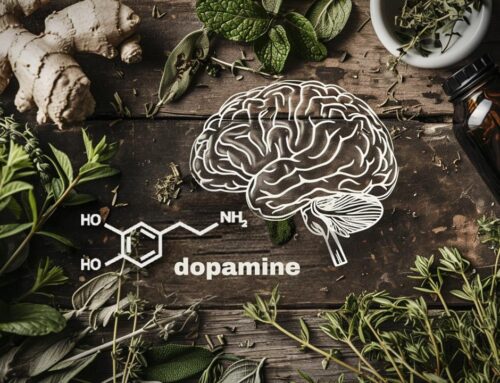Can Herbs Help an Aging Brain? Exploring Natural Remedies for Brain Health
We live in an age where the quest for longevity is intertwined with the pursuit of sustained cognitive health. As we navigate the complexities of aging, the question arises: can herbs help an aging brain? This exploration is not just for those seeking natural alternatives, but for anyone touched by the heartbreak of Alzheimer’s disease or dementia.
Key Takeaways
- Herbal treatments show promise in supporting brain health and managing dementia symptoms.
- Common herbs like Bacopa, Ginkgo, and Green Tea have been studied for their cognitive benefits.
- Safety and dosage are crucial when considering herbal remedies for brain health.
- Further research is needed to fully understand the efficacy of these herbs.
Table of Contents
- Introduction to Herbal Remedies and Brain Aging
- Understanding Dementia and Alzheimer’s Disease
- Research on Herbal Treatments for Dementia and Brain Aging
- Exploring Specific Herbs and Their Benefits
- Additional Herbs for Memory and Brain Performance
- Herbs for Holistic Brain Health
- Safety and Dosage Considerations in Using Herbs
- Herbal Therapies vs. Traditional Medicine
- Video: Herbal Interventions in Cognitive Decline and Dementia with Dr. Genevieve Steiner
- Conclusion: The Future of Herbs in Brain Health
- Frequently Asked Questions
- Additional Resources
Introduction to Herbal Remedies and Brain Aging
The journey through life brings with it the inevitability of aging, and with aging often comes concerns about cognitive health. In the realm of maintaining mental acuity as we grow older, herbal remedies have emerged not just as a trend, but as a beacon of hope in the quest for preserving brain health. The intersection of traditional knowledge and modern science sheds light on how certain herbs may be instrumental in supporting cognitive functions, potentially slowing down or even reversing the effects of brain aging.
Historically, cultures across the globe have relied on the wisdom of natural remedies to address a multitude of health concerns. This traditional wisdom, passed down through generations, has often included the use of various herbs to enhance memory, improve concentration, and combat mental fatigue. In recent times, this age-old knowledge has garnered attention from the scientific community, leading to a growing body of research exploring the efficacy and mechanisms of these herbal remedies in the context of brain health.
Plants like Bacopa, known in Ayurvedic medicine as a brain tonic, and Ginkgo Biloba, long revered in traditional Chinese medicine, are now being studied for their potential neuroprotective and cognitive-enhancing properties. These studies are increasingly suggesting that certain herbs might have a tangible impact on cognitive functions, offering a glimmer of hope for those concerned about memory loss, concentration issues, and other cognitive impairments associated with aging.
As we navigate through the complexities of aging, the exploration of herbal remedies in supporting brain health opens up a promising avenue. It offers a natural approach to potentially bolster our cognitive resilience, enabling us to maintain mental sharpness and embrace our later years with vigor and clarity.
Understanding Dementia and Alzheimer’s Disease
Dementia and Alzheimer’s disease are often spoken of in hushed tones, symbolizing a profound and personal impact on those affected. These conditions transcend mere medical diagnoses; they represent a drastic change in the life and identity of individuals and their loved ones. Dementia, a broad term, refers to a decline in cognitive function severe enough to interfere with daily life and activities. Alzheimer’s disease, the most common cause of dementia, is characterized by a progressive loss of memory and other cognitive abilities.
The journey into understanding these conditions is one fraught with emotional and physical challenges. The gradual erosion of memory, problem-solving skills, and the ability to perform everyday tasks leads not only to a loss of independence but also affects the emotional and mental well-being of both patients and caregivers. These diseases are a window into the complexity of the human brain and the vulnerability it faces as we age. Recognizing the symptoms and early signs of dementia and Alzheimer’s is crucial for seeking timely intervention, support, and care, and also underscores the importance of research and development in this field, including the potential role of herbal remedies in managing or alleviating symptoms.
Research on Herbal Treatments for Dementia and Brain Aging
In recent years, the research on herbal treatments for dementia and brain aging has gained considerable momentum, offering new insights and hope in the fight against cognitive decline. Scientists and medical researchers have been delving into the potential of various herbs, exploring their impact on dementia-related symptoms and overall brain health. This research is driven by a need to find more natural, less invasive approaches to managing and potentially slowing the progression of cognitive disorders.
Studies have primarily focused on herbs known for their antioxidant, anti-inflammatory, and neuroprotective properties. For instance, systematic reviews of human trials assessing herbs like Ginkgo Biloba and Bacopa Monnieri have shown promising results. These studies suggest that certain herbs can significantly improve symptoms of dementia without severe adverse effects. Clinical trials have observed improvements in memory, attention, and cognitive function among participants who used these herbal remedies.
Despite these promising findings, the field of herbal treatment for dementia is still evolving. Researchers continue to advocate for larger, more comprehensive studies to establish stronger evidence and understand the full potential of these natural remedies. As the scientific community explores the intricate mechanisms through which these herbs operate, there is a growing sense of optimism about their role in supporting brain health and mitigating the effects of age-related cognitive decline.
Exploring Specific Herbs and Their Benefits
The exploration of herbal remedies for brain health encompasses a variety of plants, each with unique properties and potential benefits for cognitive function. Here, we delve deeper into some specific herbs that have garnered attention in scientific research for their role in supporting brain health and combating cognitive decline.
- Bacopa (Bacopa monnieri): An Ayurvedic Solution Bacopa monnieri, a staple in Ayurvedic medicine, is renowned for its cognitive-enhancing properties. This herb, often referred to as Brahmi, has been traditionally used to improve memory and cognitive processing. Scientific studies support these uses, showing that Bacopa can enhance memory retention, increase learning ability, and potentially even repair damaged brain cells. Its neuroprotective actions are attributed to its antioxidant properties, which help in mitigating oxidative stress, a key factor in cognitive decline. Research indicates that Bacopa can also play a role in enhancing synaptic communication, thus improving overall brain function and reducing symptoms associated with dementia.
- Ginkgo (Ginkgo biloba): A Traditional Approach Ginkgo biloba, one of the oldest living tree species, is widely known for its therapeutic benefits, particularly in improving circulation and cognitive function. Ginkgo’s efficacy in enhancing memory and attention, especially in individuals with Alzheimer’s and vascular dementia, has been documented in numerous studies. Its extracts, rich in antioxidants, are thought to combat the damaging effects of free radicals in the brain. Additionally, Ginkgo has shown promise in improving behavioral symptoms associated with Alzheimer’s, such as apathy, anxiety, irritability, and sleep disorders. These benefits are attributed to its neuroprotective and circulatory stimulant properties, highlighting its potential as a valuable herb in managing symptoms of dementia and age-related cognitive decline.
- Green Tea (Camellia sinensis): Antioxidant Powerhouse Green tea, a widely consumed beverage, is lauded for its antioxidant and anti-inflammatory properties. The active compounds in green tea, such as polyphenols, have shown potential in reducing the risk factors associated with dementia, including obesity, diabetes, and cardiovascular disease. Studies suggest that regular consumption of green tea can help mitigate oxidative stress and neuroinflammation, common in neurodegenerative diseases. Notably, green tea extract, combined with other compounds like L-theanine, has been observed to significantly improve memory and attention in individuals with mild cognitive impairments. Its widespread appeal as a beverage makes it an accessible and enjoyable option for incorporating into a daily routine for brain health maintenance.
- Lemon Balm (Melissa officinalis): Calming and Cognitive Support Lemon Balm, a member of the mint family, has a long history of use in Europe for its calming and cognitive-enhancing properties. Studies have shown that Lemon Balm can improve memory and cognitive function, reduce anxiety, and even alleviate symptoms of agitation in dementia patients. Its therapeutic effects are attributed to its antispasmodic and anxiolytic properties. Additionally, the herb has been found to have a positive impact on memory and attention, making it a potential aid for those with cognitive impairments. With its pleasant aroma and flavor, Lemon Balm can be easily included in the diet, either as a tea or supplement, offering a natural way to support brain health and alleviate symptoms related to cognitive decline.
Each of these herbs, backed by traditional use and scientific research, presents a natural approach to enhancing brain health and combating the challenges of aging and cognitive decline.
Additional Herbs for Memory and Brain Performance
In addition to the well-known herbs like Bacopa and Ginkgo, there are several other herbs that have shown potential in enhancing memory and overall brain performance. These herbs are gaining recognition for their cognitive benefits and may offer alternative solutions for those seeking natural ways to support brain health.
- Rosemary (Rosmarinus officinalis): A Fragrant Memory Booster Rosemary, celebrated for its aromatic qualities, goes beyond culinary applications. Research indicates that even the scent of rosemary essential oil can enhance cognitive performance and memory retention. Studies have found that compounds in rosemary, such as rosmarinic acid and carnosic acid, can increase the level of acetylcholine, a key neurotransmitter in the brain. This herb’s potential in boosting efficiency and proficiency in mental tasks makes it a notable candidate for natural cognitive enhancement.
- Ashwagandha (Withania somnifera): The Stress-Reliever Ashwagandha, or Indian ginseng, is known for its stress-relieving properties. This herb’s neuroprotective activity stems from its rich antioxidant content, which helps prevent brain cell deterioration due to oxidative stress. Ashwagandha aids in breaking down beta-amyloid proteins, which form plaque in the brain, and promotes neurogenesis. This combination of benefits supports brain power, memory improvement, and protection against nerve cell degeneration.
- Brahmi Juice (Bacopa monnieri): The Cognitive Enhancer Brahmi, also known as Bacopa monnieri, is recognized in Ayurvedic medicine for its brain-boosting properties. This herb has been traditionally used to improve memory and concentration and is known for its antioxidant and neuroprotective effects. A study featured in Frontiers in Pharmacology demonstrated these effects, highlighting Brahmi’s potential in cognitive enhancement.
- Spearmint (Mentha spicata): The Memory Supporter Spearmint, a familiar herb in the mint family, has shown potential in supporting memory. A study noted that spearmint extract helped improve the quality of working memory and spatial working memory accuracy, making it a valuable herb for cognitive support.

Each of these herbs offers unique benefits for brain health, illustrating the diverse ways in which natural remedies can be employed to enhance memory and cognitive performance. As research continues to uncover the potential of these herbs, they represent promising options for those seeking natural ways to maintain and improve brain health.
Herbs for Holistic Brain Health
In the pursuit of holistic brain health, several herbs have emerged as beneficial not just for specific cognitive functions but for overall brain wellness. These herbs, with their unique properties, can be integrated into daily life as part of a comprehensive approach to maintaining cognitive health.
- Saffron (Crocus sativus): The Mood Enhancer Saffron, known for its vibrant color and distinct flavor, also possesses cognitive benefits. Traditionally used in various cultures for supporting brain health, recent research points to its ability to enhance mood and cognitive function, particularly in supporting healthy brain aging and focus. The use of Saffron in dishes like Spanish paella or Saffron rice can be a delightful way to incorporate this herb into a diet for brain health.
- Ginkgo (Ginkgo biloba): The Ancient Brain Tonic Ginkgo biloba, renowned for its long history in traditional medicine, supports cognitive functions such as memory, attention, and concentration. Its benefits, backed by extensive research, make it a staple in herbal approaches to brain health. Ginkgo’s antioxidants help in maintaining healthy brain function, making it a key herb in the arsenal against cognitive decline.
- Spearmint (Mentha spicata): The Cognitive Refresher Spearmint, while widely known for its culinary use, also plays a significant role in cognitive health. Studies have linked Spearmint extract to improvements in working memory, making it beneficial for daily cognitive tasks and overall brain function.
- Lemon Balm (Melissa officinalis): The Nervous System Balancer Lemon Balm, another member of the mint family, has been used both in cooking and traditional medicine for its ability to promote digestion, relaxation, and a balanced nervous system. Its extracts have shown potential in enhancing focus and calmness, aiding in the support of a tired brain.
Together, these herbs represent a holistic approach to brain health, offering benefits that range from enhancing memory and focus to supporting mood and overall cognitive function. Integrating these herbs into daily routines, whether through dietary inclusion or as supplements, can contribute significantly to maintaining and enhancing brain health.
Safety and Dosage Considerations in Using Herbs
When incorporating herbs into a regimen for brain health, it’s crucial to consider safety and appropriate dosage. While herbs offer natural benefits, they are not without potential risks, especially when consumed in incorrect amounts or in combination with certain medications.
Firstly, it’s essential to understand that ‘natural’ does not automatically imply ‘safe for everyone’. Individual health conditions, allergies, and current medications can influence how a body reacts to a particular herb. For example, Ginkgo Biloba, known for its cognitive benefits, may interact with blood thinners and should be used cautiously in individuals on such medications.
Consulting with a healthcare professional, ideally one knowledgeable in both conventional and herbal medicine, is recommended before starting any herbal supplement. This ensures that the chosen herbs complement your health profile and do not interfere with any existing treatments.
Moreover, adhering to recommended dosages is key. Overconsumption of certain herbs can lead to adverse effects. Reliable sources and professionally formulated supplements often provide guidance on safe consumption levels. By taking these precautions, one can safely explore the benefits of herbs for brain health.
Herbal Therapies vs. Traditional Medicine
The conversation around herbal therapies versus traditional medicine often centers on their differences, but it’s increasingly clear that both have unique roles in healthcare, especially in the context of brain health and dementia. Traditional medicine, based on modern scientific research and clinical trials, offers well-established treatments including pharmaceuticals, which are crucial in managing various health conditions effectively. These treatments are typically standardized, with specific dosages and regimens backed by extensive research.
Herbal therapies, on the other hand, often derive from traditional knowledge and holistic approaches to health. They may not always have the same breadth of scientific research backing them, but they offer a more natural, less invasive approach. Herbs like Ginkgo Biloba and Bacopa Monnieri have been used for centuries and are now being validated by scientific research for their cognitive benefits.
It’s important to recognize that herbal therapies can complement traditional medicine. They are not typically substitutes for conventional treatments but can be used alongside them to potentially enhance overall well-being and cognitive health. This integrative approach, combining the strengths of both traditional and herbal medicine, can offer a more comprehensive strategy for managing brain health, particularly in the realms of cognitive decline and dementia. Collaboration between healthcare providers and patients is key to crafting an effective, personalized approach that safely incorporates both methodologies.
Video: Herbal Interventions in Cognitive Decline and Dementia with Dr. Genevieve Steiner
Many assume that dementia naturally accompanies aging, but as Dr. Genevieve Steiner explains, this isn’t necessarily the case. In this episode, Genevieve and Andrew delve into the intricacies of dementia, examining how technology is used (or not used) in its diagnosis and monitoring, the role of factors like inflammation in its development, and the reasons why numerous drugs developed with the hope of curing it haven’t been successful yet. They also explore Genevieve’s groundbreaking research into the use of herbal treatments for dementia and cognitive decline.
Conclusion: The Future of Herbs in Brain Health
The exploration into the role of herbs in brain health is a journey at the exciting intersection of tradition and modern science. While current research has illuminated the potential of herbs like Bacopa, Ginkgo, and Green Tea in enhancing cognitive function and possibly slowing the progression of dementia, the future holds even more promise. As scientific inquiry delves deeper into herbal pharmacology, we can anticipate a more nuanced understanding of how these natural remedies can be harnessed effectively. This evolving field not only offers hope for those seeking natural ways to maintain cognitive health but also expands our overall understanding of brain aging and cognitive care. The prospect of integrating these ancient remedies into modern healthcare practices could pave the way for more holistic, patient-centered approaches to brain health in the years to come.







Leave A Comment